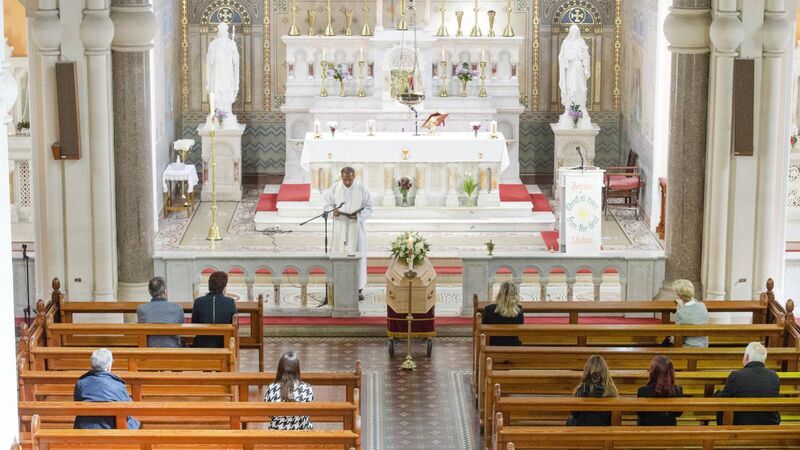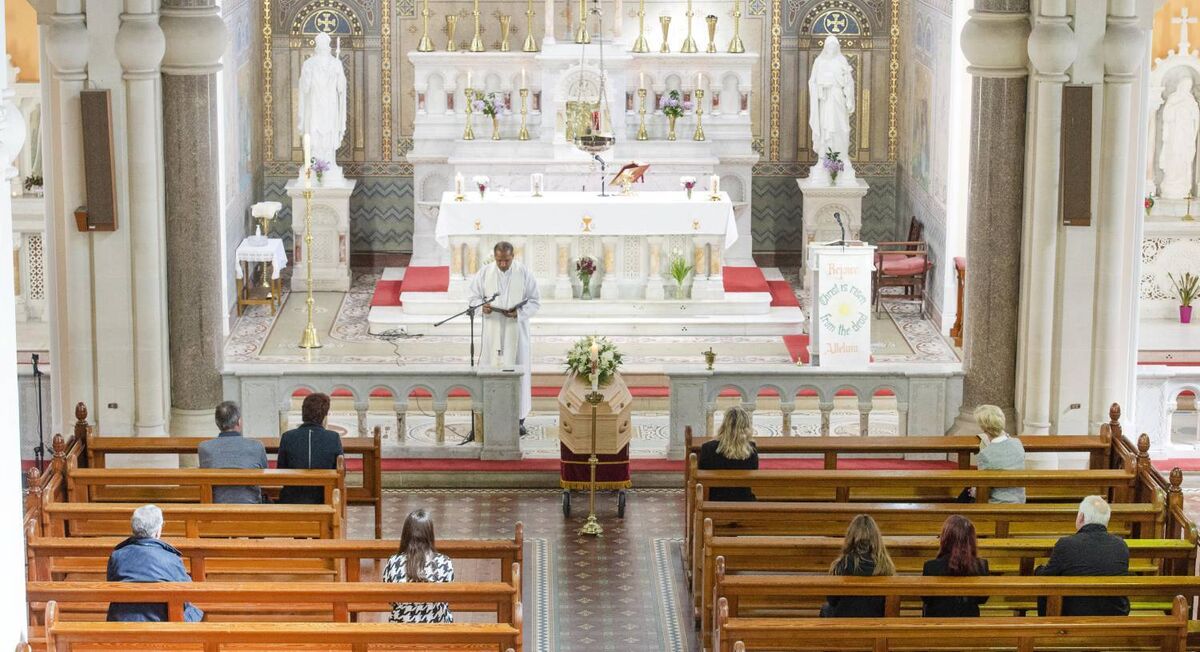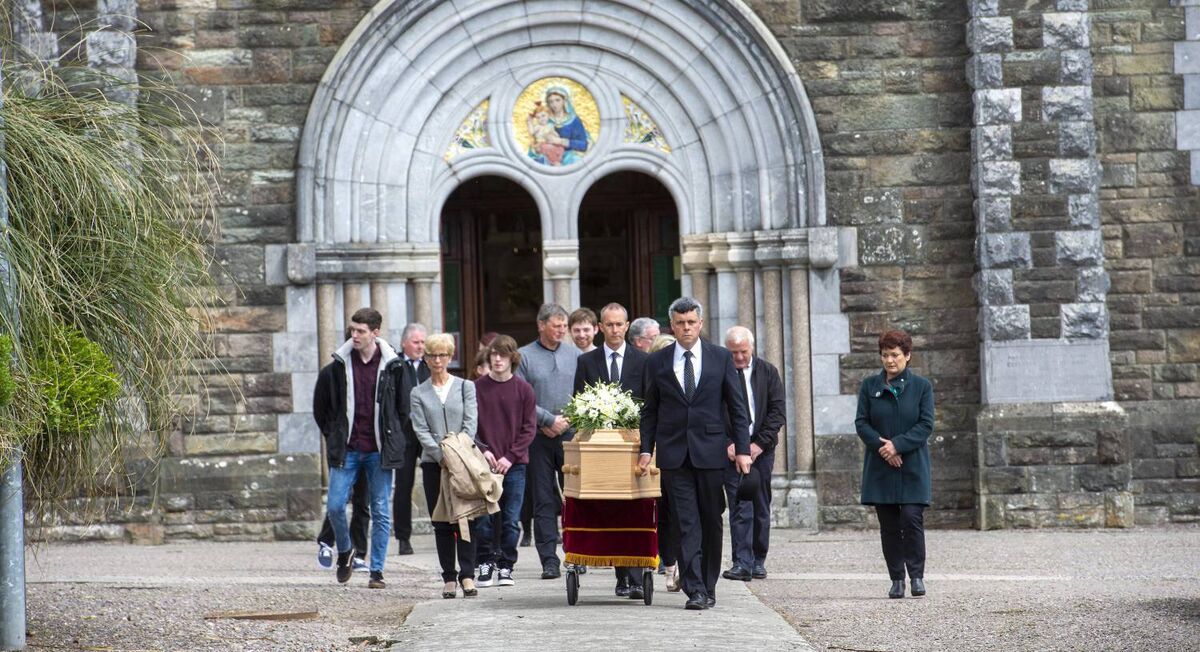Daughter of woman who died from Covid-19: ‘My mother had a very good life and she had a very good end’


Before Eily Collins was laid to rest yesterday afternoon, the 10 mourners at the 93-year-old’’s funeral were reminded that she was a hard-working mother with a quick wit who had enjoyed a great life.
Sadly, it was a life sadly ended by Covid-19, making her the tenth and latest person to die at Clonakilty Community Hospital since April 1.
The numbers are shocking and her family is the latest left devastated by what has happened at the hospital.
But one of her three daughters says people need to realise while hers and other families are distraught, so too are the staff who cared for her mother and the other residents who died.
“They were in tears at the end when my other died,” mother-of-three Colette O’Sullivan, said.
“It was like they had lost a member of their own family. How can anybody go home happy at the end of a shift when they are crying at work?
“The staff are just devastated about what has happened. Heartbroken isn’t the word for it, and it can be too easy to forget this really hits them hard.”
Despite what happened to her mother, she is adamant: “I wouldn’’t have wanted my mother to have been anywhere else.”
And she added: “While anybody might want to blame everybody and anybody in a situation like this, this is unprecedented.
“It has never happened before and it is so contagious. I don’t think it is anybody’’s fault. It is just unfortunate and it is the nature of the monster that is there.”
Ms O’’Sullivan described her mother as “one of a kind” and said the last year at the hospital was probably one of the happiest years of her life.
Diagnosed with Alzheimer’’s a few months after her 90th birthday, the family took the decision to admit her to Clonakilty Community Hospital just under two years ago.
“When we made the decision, we were so upset and thought this is going to be desperate,” Mrs O’Sullivan said.
“But she went in there and she loved being in there. The staff were devoted to her and they remained devoted to her right up to the very end.”
Her mother was admitted to the hospital’s Saoirse Unit, which is where people with dementia are cared for.
One of the hospital’s smaller units, it houses 16 residents.
The family initially had reservations because there were six beds in a dormitory-style setting.
“We thought Mam is really going to be upset with this sharing rooms because she always lived on her own,” she said.
“The funny thing was she actually loved it. She received absolutely the best care anybody could ever get.
“That is where she ended up and yes, that is where she died. She went peacefully and that was down to the nurses and the doctors, so we could never be more than grateful for that.
“We have been very lucky: my mother had a very good life and she had a very good end.
“We couldn’’t look after her and the nurses and carers became her family and they looked after her just as good as what we would have done.
"An example of their care was when our mother was going to leave the home to attend a family wedding about eight months ago.
"The staff fussed over her and made sure she looked great for the day.
"One staff member even went shopping for a hair fastener for her on their day off and brought it in the next day.
"That is not someone doing their duty.
"That is someone going above and beyond."

When the family got the call from staff to tell them their mother was Covid-19 positive, it was the call they had all dreaded getting.
“She didn’t really know that she had Covid-19, but here’s the thing - she wasn’t sick,” Mrs O’Sullivan said.
She had a slight temperature on the morning of Sunday, April 12 and cold-like symptoms.
She was tested and while she waited for the results, she was placed in isolation.
When the first two weeks were over, her mother - who was diagnosed as positive - was “perfect” but on Wednesday, April 22, she suffered a blood clot. It happened just two days before Irish researchers published a paper revealing they had discovered a factor in Irish patients admitted to hospital with severe Covid-19 is blood clots.
A study led by clinician scientists at Royal College of Surgeons Ireland University of Medicine and Health Sciences in Dublin found abnormal blood clotting contributes to death in some Irish Covid-19 patients. The study, carried out by the Irish Centre for Vascular Biology, RCSI and St James’’s Hospital, Dublin, has only just been published in the current edition of the British Journal of Haematology.
They also found those with higher levels of blood clotting activity had a significantly worse prognosis and were more likely to require ICU admission.
Emerging evidence also shows the abnormal blood-clotting problem in Covid-19 results in a significantly increased risk of heart attacks and strokes.
In order to see their mother in her final days, each of the three sisters were allowed in to Eily Collins but only one at a time and only dressed head to toe in Personal Protective Equipment (PPE), including a water-proof hazmat suit, gloves and a face visor.
Mrs O’Sullivan was with her in the hospital when she died at 9pm on Wednesday evening.
“I went in at 7pm and the nurses were just lovely, so welcoming and they let me sit with her with the result that I was there when she died, which means an awful lot to a family.”
Reflecting back, Mrs O’Sullivan said: “My mother was 93 and she never had a sick day in her life, how can you complain about that? She was so happy there”
She has nothing but praise for the staff.
“They are just so amazing,” she said. "I heard them talking to all the patients on the ward. They go up and they talk to them in a really bright voice as if there is nothing to worry about and they’’re joking and laughing with them. They knew she was dying, they knew very early on but they never changed.”
Fr Sibi Joseph Arackal, of the Clonakilty parish, officiated at the 45-minute 12pm requiem mass in the Church of the Nativity of the Blessed Virgin Mary, Timoleague.
It is unusual to see a church service at funerals these days due to the ongoing Covid-19 restrictions and many of the churches around the country are closed to them.
Or, as is often the case, families are only being offered grave side blessings either due to the restrictions or to a shortage of priests.
Funeral director John Michael Foley, who has been offering church services throughout the Covid-19 crisis led Mrs Collins’ hearse through Timoleague village after yesterday’s mass.
About 100 local residents, unable to attend due to Covid-19 restrictions on mass gatherings, lined the route standing respectfully two metres apart from their neighbours.
“There is a perception that there are no longer requiem masses at funerals,” Mr Foley said later. However, in consultation with the clergy this can be arranged. Masses are similar to before the crisis but with restrictions in the numbers in attendance to a maximum of 10. Families have said the Mass is more personal as a result."





